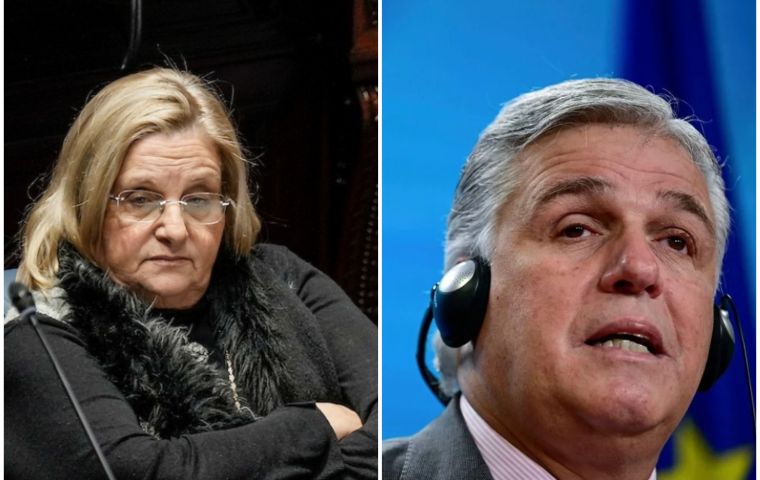MercoPress. South Atlantic News Agency
Spain summons Uruguayan ambassador over criticism of PSOE by interim vice-president
 Acting VP Graciela Bianchi (left) asserted that the PSOE “has secured funding and embraced the values of Ibero-American narco-dictatorships.” FM Bustillo (right) apologized to his Spanish counterpart
Acting VP Graciela Bianchi (left) asserted that the PSOE “has secured funding and embraced the values of Ibero-American narco-dictatorships.” FM Bustillo (right) apologized to his Spanish counterpart The Spanish Ministry of Foreign Affairs has summoned Uruguay's Ambassador to Madrid, Ana Teresa Ayala, in response to controversial statements made by acting Vice President of the Uruguayan government, Graciela Bianchi, concerning Spain's Socialist Party (PSOE) in the wake of the recent Spanish general elections.
During the absence of Vice President Beatriz Argimón, Senator Graciela Bianchi drew sharp criticism when she asserted that the PSOE “has secured funding and embraced the values of Ibero-American narco-dictatorships.”
Following the developments, sources from the Spanish Ministry of Foreign Affairs confirmed that Ambassador Ayala was received by Juan Fernández Trigo, the Secretary of State for Ibero-America and the Caribbean, EFE informed. Trigo conveyed Spain's strong disapproval of the comments made by the Uruguayan Senator.
Taking to Twitter, Bianchi doubled down on her stance, stating, “With the PSOE, you get the financing and values of the Cuban, Venezuelan, Nicaraguan, and Iranian narco-dictatorships, as well as ETA terrorism and Catalan separatism seeking to dismantle Spain. A luxurious choice. But the PP won.”
Debe leerse: con el PSOE se tiene asegurado la financiación y los valores de las narcodictaduras cubana, venezolana, nicaragüense, iraní, el terrorismo de la ETA, y el separatismo catalán que quiere terminar con España. Un lujo de opción. Pero ganó el PP. pic.twitter.com/fGMo8RyDBX
— Graciela Bianchi (@gbianchi404) July 24, 2023
The acting Vice President further criticized the PSOE, drawing a sharp distinction between the current party and the PSOE under the leadership of former Spanish President Felipe González. Bianchi referred to the “sanchismo” (referring to Pedro Sánchez' rule) in the PSOE as an ideology reminiscent of the Spanish Civil War, “characterized by communism and anarchism.” She even claimed that had the PSOE not undergone an implosion, it would still be admiring the Soviet regime, with Stalin as its inspiration. Bianchi remarked, “By studying history you can realize about it.”
The controversy surrounding Bianchi's statements has strained diplomatic ties between Spain and Uruguay, prompting the Spanish government to take the matter seriously and formally summon the Uruguayan Ambassador for a meeting.
After the Spanish action, the Spanish Foreign Minister, José Manuel Albares, spoke by telephone with his Uruguayan counterpart, Francisco Bustillo. In the call, according to El Observador, the episode was considered to have been overcome at an institutional level. The conversation also took place while Bustillo was at the Spanish embassy in Uruguay, conveying the apologies of the Uruguayan government to the ambassador of the European country, Santiago Jiménez Martín.
In a tweet referring to the episode, Albares called to continue working to deepen relations between the two countries. He added: “We also agreed to boost the EU-Latin America relationship during the Spanish Presidency”.
He conversado con mi homólogo de Uruguay, Francisco Bustillo, sobre las excelentes relaciones bilaterales entre España y Uruguay. Seguiremos trabajando por profundizarlas. También abordamos el impulso a la relación UE-América Latina durante la Presidencia española @eu2023es. pic.twitter.com/xvKAd7zytO
— José Manuel Albares (@jmalbares) July 26, 2023
In the aftermath of the recent Spanish general elections, the conservative Partido Popular (PP) emerged as the winner with 136 seats. However, the party fell short of the 176 seats required for an outright majority to form a government. The Partido Socialista Obrero Español (PSOE), led by the incumbent President of the Spanish Government, Pedro Sánchez, secured 122 seats. Meanwhile, the far-right Vox party obtained 33 seats, and the left-wing coalition Sumar acquired 31 seats. With the left-wing parties exploring the possibility of forming a government, the political landscape remains complex and fluid.




Top Comments
Disclaimer & comment rulesCommenting for this story is now closed.
If you have a Facebook account, become a fan and comment on our Facebook Page!